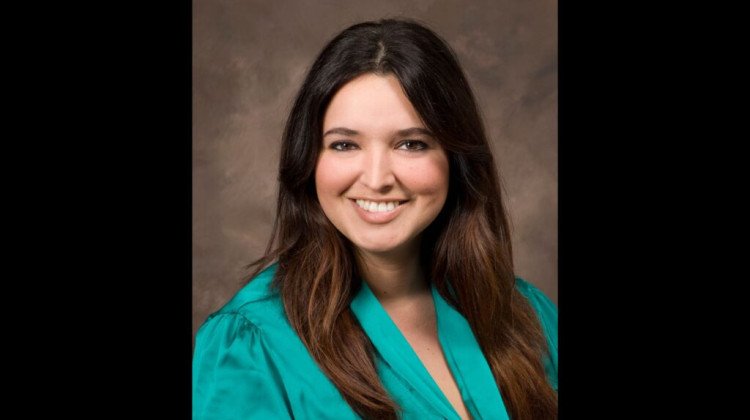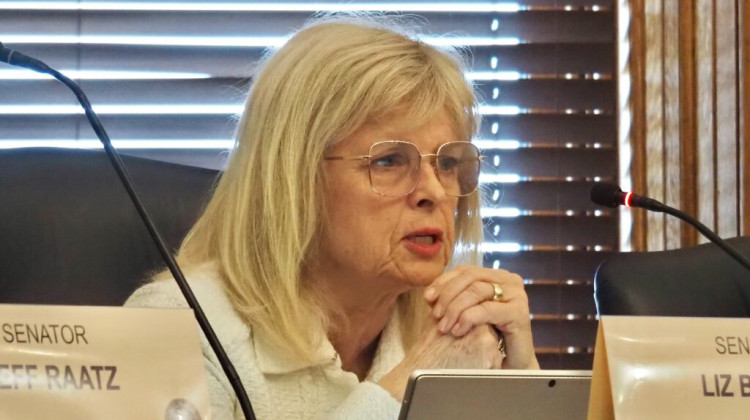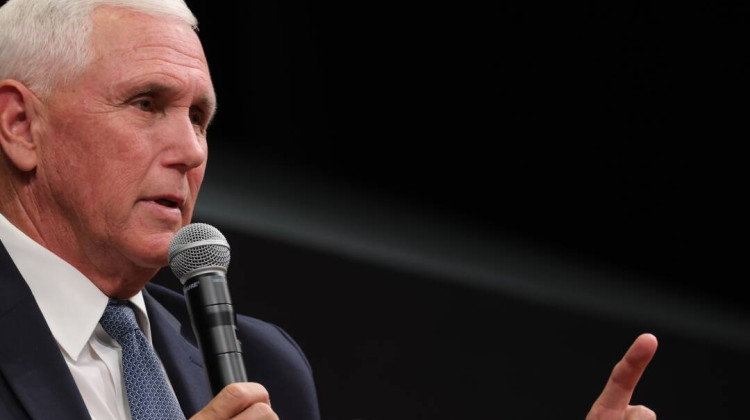
Sheriff Jerry Goodin vowed to make Scott County a drug-free zone when he took office in January.
Zach Herndon/WFIU-WTIU NewsJerry Goodin took over as Scott County Sheriff on Jan. 1 and immediately promised to make the county a drug-free zone. His office recently put together a press release titled "We Mean What We Say." It details more than a dozen drug-related arrests officers made during the first two weeks of January. The charges range from unlawful possession of a syringe to marijuana dealing.
But, public advocates worry about how the aggressive stance on drugs could impact rehabilitation efforts in the county at the heart of a devastating HIV outbreak a few years ago.
"When you have these systems that are kind of counteracting each other, it often creates more barriers as well as other harms," says Carrie Lawrence, director of Project Cultivate at the Rural Center for STD/AIDS Prevention. "Because the individual is less likely to seek out treatment or help."
Reporter Barbara Brosher interviewed Sheriff Goodin about his controversial approach.
What challenges do you think are biggest for Scott County?
Well, our challenges really are no different than any other county. Obviously we’re all dealing, you know what I’m saying, with the drug issue. And, we have a plan obviously to battle that head on. And, we think we have a plan that’s going to work.
And, coming from a small county obviously our challenge is money. A lot of the problems and a lot of the issues we have need money to be solved or should have large amounts of money to be solved. Being a small county, we don’t have the tax base or the resources to do what we would like to do.
Pretty soon after you took over as Sheriff, you announced an aggressive plan to tackle the drug problem. Can you tell me what that strategy is?
There’s no secret to the strategy, we want everybody to know. My very first day in office I declared Scott County a drug-free zone, basically saying we would not tolerate any drug activity. It doesn’t matter if you’re dealing, possessing, whatever you’re doing. As a matter of fact, we said if you’re traveling on the interstate, if you’re traveling on our roadways, if you’re carrying drugs, we don’t even want you to come through our county.
We were very strong on that issue and what we told people was you’re either going to be with us or against us with the community. And, what I meant by that was you’re either going to, if you’re dealing drugs, you’re going to quit dealing drugs. And, you’re going to be a part of society and we’re all going to get along well together. Or, if you’re not going to do that, then we ask you just to move out of the county, go somewhere else. And, if you don’t want to do those two things then what we’re going to do is we’re going to arrest you. Because the vast majority and the silent majority in this county says enough’s enough.
A lot of people from other parts of the state, when they hear Scott County, one of the first things they think about is the HIV outbreak and the drug use that was associated with that. And, one thing health officials say really helped curb the HIV outbreak is the syringe exchange that's going on. Where does that fall into this aggressive strategy you have of cracking down on the drug problem and arresting people who are involved in that activity -- when there's a syringe exchange that is legal and people are participating in?
With our strategy we have, it’s not a one thing strategy where we’re arresting everybody. There ain’t nobody stupid enough across this whole United States that thinks you can arrest yourself out of this problem. We know that.
Part of our strategy is this: we are aggressively attacking drug dealers. We’re going after drug dealers, aggressively. Not only are we aggressively going after drug dealers, but we’re aggressively, know what I’m saying, going after those folks that are doing the drugs. And here’s the reason why. We’re going to offer them help when they get inside this jail. We’re going to start a rehab when they get inside this jail. We’re going to offer them help when they get inside this jail. We’re going to start a rehab when they get inside this jail.
I’ve got my jail commander now, we’re putting together a program and we’re going to be working with the DOC, we’re going to be working with our local agencies CEASE here in Scott county the drug coalition type thing, we’re working with all these entities, we’re working with churches, we’re working with everybody that says they have a solution to this problem of addiction.
Some advocacy groups do worry though that such an aggressive stance could put fear in some people’s minds who maybe are trying to participate in the syringe exchange, or perhaps make people afraid to even seek out help?
If they’re not dealing drugs, what would they be afraid of? We’re offering them help. We’re offering them a chance to succeed. We’re offering them hope.
Obviously, as a law enforcement officer, I have to say I’m adamantly against the needle exchange, as a law enforcement officer, okay. And, there’s probably not too many law enforcement officers that’s going to tell you they’re for a needle exchange, okay. As a law enforcement officer strictly, I’m against the needle exchange.
However, I’ll tell you this: I’m not a dumb dumb. And, if the Surgeon General of the United States of America, who was our surgeon general or health adviser in Indiana at the time that said we needed a syringe exchange, if that person tells me we need a syringe exchange guess what, I’m not stupid to tell that guy who is educated, who knows exactly what they’re talking about, who that’s their business, I’m not going to tell them, 'No we don’t need a needle exchange.' Because I’m not educated enough on the subject to know if we need a needle exchange.
I think we need to get a little bit stricter, and I’ve already talked to our health department. And, I think it needs to be a true needle exchange where you bring one in, you get one, okay? And, we’re already in talks with our health department and other agencies to make sure that happens.
 DONATE
DONATE








 Support WFYI. We can't do it without you.
Support WFYI. We can't do it without you.